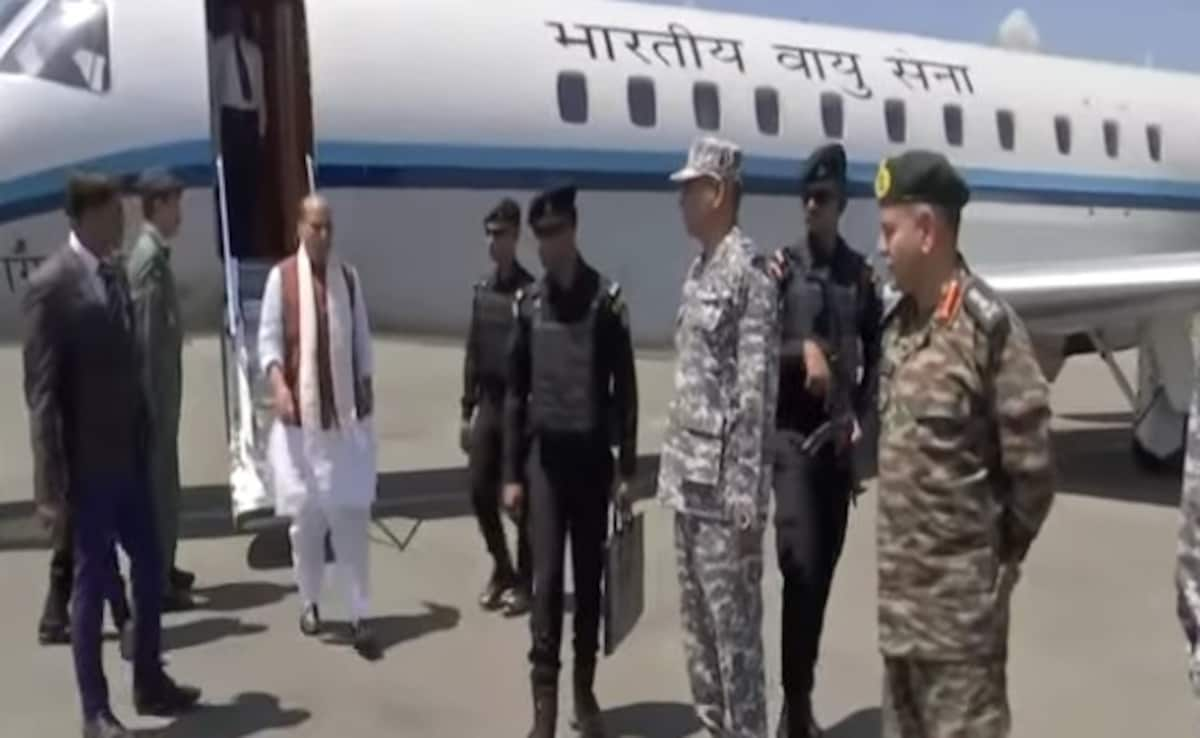Rajnath Singh’s Visit to Jammu and Kashmir: A Focus on National Security
In an urgent plea for international attention and intervention, Defence Minister Rajnath Singh raised serious questions about the safety of nuclear weapons in Pakistan during his recent visit to Srinagar, Jammu and Kashmir. This visit comes in the wake of India’s intense military operation, dubbed Operation Sindoor, which targeted terror bases within Pakistan in retaliation for a deadly terror attack in Pahalgam on April 22. Accompanied by Jammu and Kashmir Lieutenant Governor Manoj Sinha, Singh’s trip is indicative of the heightened focus on national security in a volatile region rife with geopolitical challenges.
Singh arrived in the Valley early Thursday morning, marking his first visit since the launch of Operation Sindoor. During this trip, he aimed not only to assess the security landscape but also to bolster morale among the Indian Armed Forces, particularly after a series of military provocations from Pakistan. The Defence Minister engaged with army personnel, reviewed their readiness, and scrutinized Pakistani artillery shells recovered from the region.
Throughout his engagements, Singh paid tribute to the sacrifices made by Indian soldiers, honoring their bravery in the ongoing fight against terrorism. “I bow to the supreme sacrifice of the brave jawans while they fought terrorism and terrorists,” he stated emphatically. This personal homage to the fallen and wounded highlights the human cost of conflict and the ongoing struggle against extremism.
Singh described Operation Sindoor as a “big commitment,” reinforcing India’s resolve against terrorism by stating, “We will go to any extent to end terrorism. Pakistan has to stop sheltering terrorists.” His direct challenge to Pakistan regarding its nuclear arsenal signifies a broader debate about regional security dynamics and the implications of nuclear weapons in unstable regions.
Recent Military Actions and Escalating Tensions
In the current context, India’s recent military actions have underscored the escalating tensions between the two nations. Earlier this week, Prime Minister Narendra Modi also visited the Adampur air base in Punjab, where he delivered a stern message regarding India’s military readiness and commitment to protecting its sovereignty. Modi’s remarks followed an alleged attempt by Pakistan to breach Indian airspace during the night of May 9 and 10, shortly after the commencement of Operation Sindoor.
During his address at the airbase, Modi emphasized that any future attacks on Indian soil by Pakistan would be met with decisive retaliation. He referenced past conflicts, notably the Uri attack in 2016 and the Balakot airstrikes in 2019, asserting, “Our intent is clear… if there is another attack, India will respond.” This declaration outlines a clear shift in India’s strategic posture, with a newfound focus on aggressive countermeasures against state-sponsored terror.
Operation Sindoor itself is described as unprecedented, involving 24 missile strikes across nine selected locations in both Pakistan and Pakistan-Occupied Kashmir in a rapid-fire 25-minute window. Officials suggest that around 100 terrorists were neutralized during these strikes, a tactical shift aimed at targeting key terrorist leadership rather than foot soldiers. This approach indicates a strategic evolution in India’s military operations, moving towards proactive and preemptive actions rather than reactive ones.
As tensions continue to simmer, India has found itself repelling multiple drone and missile attacks launched by Pakistan, which have targeted Indian military installations across Jammu and Kashmir, Rajasthan, and Punjab. While Pakistan initially called for a ceasefire, this was soon violated, indicating the fragile nature of the current peace.
The International Community’s Role
The implications of Singh’s remarks regarding Pakistan’s nuclear arsenal cannot be overlooked. The question of whether nuclear weapons are safe in the hands of Pakistan is particularly pressing, given the tumultuous relationship between the two countries and the history of conflict spanning decades. Singh’s call for international intervention reflects a growing concern among global leaders regarding regional stability and nuclear proliferation.
As per the report by BBC News, the international community has long been aware of fears associated with Pakistan’s nuclear capabilities. Analysts warn that any escalation in the India-Pakistan conflict could potentially lead to catastrophic outcomes, especially given both nations’ nuclear arsenals.
Moreover, scrutiny of Pakistan’s internal politics may also be necessary, as internal instability can have direct implications for its nuclear policies. The CNN analysis outlines how ongoing political chaos could potentially compromise the control and safety of nuclear weapons. Such considerations only emphasize the importance of Singh’s call for international oversight and verification.
Stabilizing the Region Through Dialogue
While military readiness and action are critical, the long-term solution to the India-Pakistan conflict likely lies in dialogue and diplomacy. Both nations have a shared responsibility to de-escalate tensions and pursue peaceful resolutions. As regional actors and international stakeholders, the global community must encourage constructive dialogue while holding both nations accountable for escalating hostilities.
In conclusion, Defence Minister Rajnath Singh’s recent statements and military actions reflect a critical moment in India-Pakistan relations. With questions surrounding nuclear safety and regional security at the forefront, the call for international intervention serves as a reminder of the complex challenges facing both nations—and the urgent need for sustained dialogue and commitment to peace.
For more insights on India’s military strategy and international relations, check out our article on India-Pakistan Diplomacy and our detailed report on Operation Sindoor: A Tactical Overview.
DISCLAIMER
We have taken every measure to ensure that the information in this article and on our social media platforms is accurate, verified, and obtained from reliable sources. For feedback or complaints, please contact us at info@hamslive.com.


